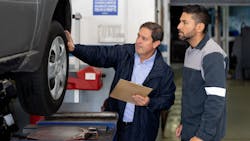In the spring of 1976, I landed a job as a technician in a small two-bay gas station in the northeast section of the Bronx, New York. This was four years before I opened my own repair shop. On my first day, during a coffee break, Randy, the shop owner, pulled me aside and said, “Joe, it’s your first day here, so I need to tell you something. There are three ways of doing things: the right way, the wrong way and my way. You do things my way and we’ll get along just fine.”
Now, it’s important to mention that Randy was part of the World War II generation, and his version of “onboarding”, while it may appear harsh by today’s standards, was said partly in jest. His statement, however, did set a tone for the way things were. It was a message that “we” the elders have proven ourselves, and now it’s time for you to prove yourself.
Randy was big on team spirit and hard work. He would often preach, “We work as a team, and I expect you to work hard. Don’t complain about the cold in the winter or the heat in the summer, I can’t control that.” Again, tough words, but not mean words. We understood that he realized how difficult this business is, and it was his job to ensure we could endure it.
With just two bays and three technicians, the workspace was tight. If a job needed to be done, Randy would not hesitate and tell me to get a few jack stands and work outside, even in the winter months. His days growing up in hard times and as an Army sergeant still echoed in his actions, decisions, and values.
Randy was proud of the career he chose in the auto industry and wanted us to be proud, too. He willingly shared his knowledge and experience. He also told stories of growing up during the Great Depression and his time serving as a combat soldier in Europe during WWII. But there were certain things that he would not tolerate. For example, being late for work. Randy made it clear that being late was the height of disrespect for not just the company you work for but for your fellow workers. Randy not only taught us automotive mechanics, but he also taught us the mechanics of life.
If you’re thinking I want to go back to those times, I don’t. The past is the past, and the present is the present. However, I think we can learn from some of the old-school ways. While we often view that as back then—it was my way or the highway, for the most part—the boss was right there in the trenches with you, they never feared dishing out constructive criticism when needed, and they understood that for the shop to win, the team had to win.
Today, the typical repair shop is much different, and in many ways, better. Today we have bigger shops with better working conditions. We have better tools, advanced equipment, improved training and shop owners have a better understanding of how to grow a business. But, has the shop culture improved enough over the decades? I am not so sure. If it did, why don’t we attract and retain more people in our industry, especially technicians? It may not have been a walk in the park working for Randy, but he taught me valuable life lessons that I would carry with me throughout my career. Perhaps a blend of old school and new school is what’s missing from so many of today’s leaders.




